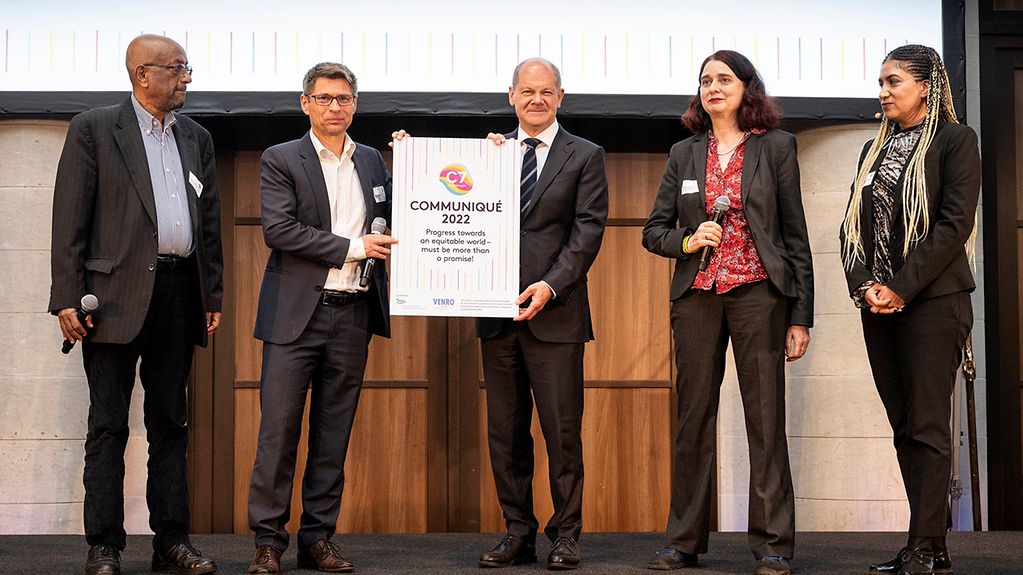Civil 7 Summit
Civil society organisations are among those with a key role to play in the context of Germany's presidency of the G7. Along with other Engagement Groups, they will be involved in the preparations for the G7 summit at the end of June. Speaking at the “Civil 7” summit, Federal Chancellor Scholz stressed that, “It needs you, particularly at this time!”

Representatives from Civil 7 present their recommendations for preparations for the G7 summit.
Photo: Federal Government/Bergmann
“Progress towards an equitable world” is the headline of the German G7 presidency. In his speech to the Civil 7 (C7) Summit in Berlin, the Federal Chancellor stressed that this was a goal that could only be achieved together. For this reason, he went on, international organisations would be invited to the G7 summit in Elmau at the end of June, along with other heads of state and government. This was why, in his view, the involvement of civil society in preparations for the summit was “a key pillar of our presidency .”
Scholz described how the G7 was more than just a coalition of western industrial nations: “it is a strong alliance that rests on free, democratic values and aspirations,” he said. Democracy needed a thriving civil society, the Federal Chancellor: “It needs you, particularly at this time!”
The C7 Summit was the first of seven meetings with seven different Engagement Groups. The meetings are helping prepare for the G7 summit in Elmau at the end of June. The other Engagement Groups are from business, the world of work, science, think tanks, women’s associations and young people.
Civil society at a greater premium than ever
Scholz stressed that the horrific war of aggression against Ukraine had created an unprecedented level of agreement within the G7, which were more united than ever before. “Our values – freedom, justice and democracy – must be defended together and upheld against oppression, injustice and authoritarianism.
Scholz argued that there was a greater need than ever before for the expertise, counsel and experience of civil society. “Especially because we are seeing how around the world, the scope of action for civil society is being restricted.” It was against this trend that Germany wanted to set a clear example through its presidency of the G7, Scholz said.
It was for this reason, he explained, that protection programmes for human rights campaigners, academics, journalists and artists are being strengthened, as are accountability mechanisms and international criminal jurisdiction.
Civil society action binds us together and can overcome boundaries
Some 30 million people in Germany are involved in civil society action in many different ways, with many giving up their time as volunteers. “They’re doing their bit, getting stuck in where it’s needed,” said Scholz, pointing out that this commitment binds people together.
“We can see this happening right now in the solidarity being shown to refugees from Ukraine,” the Federal Chancellor said. Hundreds of thousands of paid and volunteer supporters surpass themselves, often through the coordination and organisation of internationally connected civil society organisations.
The Federal Chancellor reiterated how experts on the ground facilitate cross-border aid, document atrocities, provide information about conditions and help fight off disinformation. “Their efforts demand bravery and great intercultural skill, which is another thing that is urgently needed,” he said.
For the G7, Scholz noted that this would mean more intensive discussions with regard to coordinated responses to disinformation campaigns.
A key role in global challenges
The Federal Chancellor emphasised the need for the support of civil society in facing up to global challenges, saying that the ongoing COVID-19 pandemic, man-made climate change, food and energy security and the economic transformation “demand creative responses and fresh thinking.”
Federal Chancellor Scholz expressed his conviction that “if you want to move change forward, you need to work with those who stand for change.” In this, he argued, a key role fell to civil society organisations. They were, he said, not only a means of communicating with civil society but also “important seismographs that sound the alarm.” He also underlined the active role that falls to these organisations in developing policy, which was more than just contributing to discussions and participating.
Support and counsel from civil society in demand
Whether in terms of the desired paradigm shift in international climate policy or the goal of global health, the Federal Chancellor highlighted the need for the support and counsel of partners in civil society. For this reason the Federal Chancellor thanked all the organisations that were participating in the C7 process. He thanked VENRO and the German Forum on Environment and Development for coordinating the process and involving civil society perspectives from countries outside the G7.
“In this spirit we are making preparations for the summit in Elmau in just under two months,” said Scholz, emphasising that the aim is for this meeting to send out a strong signal from the G7 in support of “progress, prosperity, peace and security.” He assured the C7 that their recommendations and advice would be integrated into the work of Germany's G7 presidency.